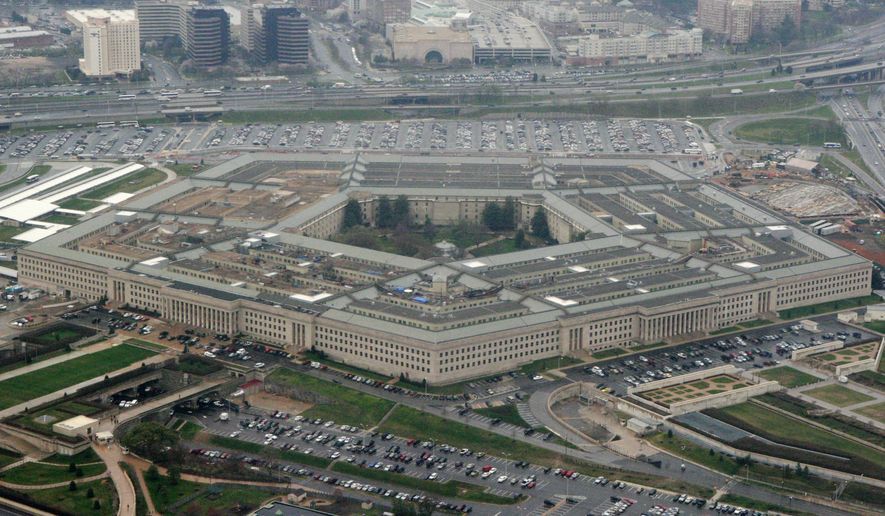Pentagon officials said Tuesday they’ll stay out of President Trump’s landmark diplomacy with Kim Jong-un — but they also emphasized that, so far, military leaders have gotten no formal instructions to follow through on the president’s words and immediately cancel joint military exercises with close ally South Korea.
Officials said Defense Secretary James N. Mattis has been kept in the loop as the White House opened public negotiations with the previously reclusive North Korean leader during a landmark summit in Singapore on Monday night. They said Mr. Mattis was not caught off guard and had been consulted before Mr. Trump shockingly declared the U.S. would cease the joint military exercises, which the president called “provocative” and suggested would be a barrier to lasting peace with Pyongyang.
The exercises — two drills held in the spring, and another in the late summer or early fall — have become a staple of the American presence on the Korean peninsula and offer regular reassurances to South Korea, Japan, and other allies in the region that the U.S. is fully prepared to deter any possible North Korean aggression.
For now, U.S. military leaders say they’ve received no orders to cancel an upcoming drill scheduled for later this summer, a massive yearly exercise known as Ulchi Freedom Guardian. Last year, the 10-day computer-simulated exercise involved more than 17,000 U.S. troops, in addition to South Korean forces, according to the Defense Department.
Still, despite the uncertainty around whether the exercise is still scheduled, Pentagon spokesperson Dana White told Reuters on Tuesday “there were no surprises” when Mr. Trump raised the issue following his meeting with Mr. Kim. Beyond that, the Defense Department had little else to say, sticking to Mr. Mattis’ stated policy of keeping the military out of diplomatic efforts.
“The Department of Defense welcomes the positive news coming out of the summit and fully supports the ongoing, diplomatically-led efforts with the Democratic People’s Republic of Korea,” Ms. White said in a statement later Tuesday. “Our alliances remain ironclad, and ensure peace and stability in the region. The presidential summit outcome is the first step along the path to the goal: complete, verifiable and irreversible denuclearization of the Korean Peninsula and a free and open Indo-Pacific.”
SEE ALSO: Donald Trump says U.S. to halt South Korea ‘war games’ after Kim summit
While Mr. Mattis apparently was informed that the president intended to raise the issue, it’s unclear how far the news had traveled through the Pentagon before Mr. Trump brought it up.
“It’s a very provocative situation,” the president said of the drills. “No. 1, we save money. No. 2, I think it’s something they very much appreciate [during the nuclear negotiations].”
He said the U.S. will not be removing any of its roughly 28,000 troops stationed in South Korea in the near term, though he did say that was one of his ultimate goals.
“No, we’re not reducing anything,” he said. “I want to bring our soldiers back home. But that’s not part of the equation right now. We will be stopping the war games, which will be saving us a tremendous amount of money.”
U.S.-South Korean military exercises have been held regularly for decades and grew out of the two nations’ steady military partnership following the Korean War.
Mr. Trump did not give any specific dollar figures on how much the exercises cost, and the Pentagon typically has not released estimates.
In addition to Ulchi Freedom Guardian, the U.S. military also holds two concurrent drills in the spring: Foal Eagle and Key Resolve.
Foal Eagle involves more than 11,000 U.S. troops and nearly 300,000 South Korean forces, the Pentagon has said, and focuses on field training. Key Resolve involves about 12,000 troops and 10,000 South Koreans and is geared more toward computer-simulated efforts.
While many lawmakers and some analysts were stunned Tuesday that Mr. Trump would offer to pull those exercises, specialists say they could be shelved temporarily with little impact to American readiness on the Korean Peninsula.
“This does not in any way diminish our readiness of our capabilities in the near term at all. We could do this in our sleep. We’ve done it for decades,” said retired Lt. Col. Daniel L. Davis, a senior fellow and military expert at Defense Priorities, a think tank that advocates for a more restrained U.S. foreign policy.
Specialists say that if the exercises are put on the table to gain concessions from Mr. Kim, the move makes sense. But permanently canceling such exercises — especially if the U.S. gets no concrete denuclearization commitments in return — could lead to problems.
“It won’t hurt readiness if we don’t do exercises for a year, 18 months … Anything past that would really start to harm things,” said Henry J. Kazianis, director of defense studies at the Center for the National Interest.
⦁ Dave Boyer contributed to this report
• Ben Wolfgang can be reached at bwolfgang@washingtontimes.com.




Please read our comment policy before commenting.